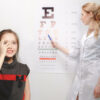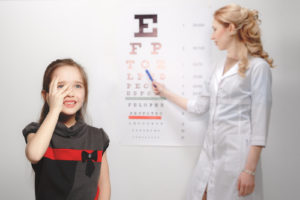
Your Child and Myopia
More and more children are being diagnosed with myopia, or nearsightedness, every year. Many people are wondering why there has been such an increase in the number of children who are nearsighted. In addition, there are questions as to what exactly causes nearsightedness in children and what the long-term risks are. What about the children who are diagnosed with severe cases of myopia? In this article, we’ll discuss everything there is to know about this confusing and increasingly common diagnosis.
What Causes Myopia in Children?
One possible cause for myopia in children is genetics. If one or both parents has myopia, there is a possibility that their children will develop myopia. However, genetics isn’t the only culprit. Environmental factors also play a large role in myopia diagnoses.
According to a recent study conducted in Spain, the amount of time spent indoors plays a large role in the development of myopia in children. After creating a profile for each of the participants that included how much time they spent doing close work daily versus how much time they spent outdoors, the researchers conducted vision tests to measure visual acuity. The study shows that children who spend more time outdoors are less likely to be diagnosed with myopia. Children who spend most of their time watching TV, playing video games, reading books, and doing other indoor activities are more likely to be diagnosed with myopia. Because of these results, the researchers declared that myopia in children is a public health problem that needs to be addressed at both the individual and community levels.
The reasoning behind exactly why being outdoors more can possibly prevent myopia isn’t really understood. However, many doctors and scientists believe it’s because when children are outdoors they focus more on objects that are in the distance. Indoors, things like the TV, books, and video games are usually fairly close to the child’s eyes.
However, it’s also thought that the difference in indoor lighting versus outdoor lighting plays a role in myopia diagnoses. It’s said that the lighting outdoors is about 200 times more powerful than indoor lighting.
The exact cause has yet to be specifically pinpointed. But, the consensus is that it’s a combination of genetics and various environmental factors that lead to myopia. Basically, kids need to spend a little less time inside and more time enjoying activities outside in natural light.
Why Have Child Myopia Diagnoses Increased?
Since around 1970, the number of children and adults diagnosed with myopia has significantly increased. According to the Myopia Institute, in 1970, 25 percent of people ages 12 to 54 had myopia. That number had risen to over 42 percent as of the year 2009 and has since continued to rise. As of now, it’s expected that 50 percent of the world’s population will be myopic by 2050. The reason behind the increase is, again, possibly linked to the fact that kids, and even adults, are spending more time indoors now and in the last couple of decades than they ever used to.
Long-Term Risks of Myopia in Children
Children and adults who have myopia of less than 6.00D will not usually face any additional risks associated with myopia. This is because their vision can be corrected properly with eyeglasses or contact lenses. However, those with myopia of more than 6.00D have a higher chance of retinal detachment, glaucoma, and cataracts at an earlier age than normal.
How to Tell If Your Child Has Myopia
 Sometimes, even if their vision is blurry, kids may not realize that there is a problem with their eyesight. Often, the only way to know if your child is having vision problems is to take them for an eye exam. However, if your child has myopia and it has not yet been diagnosed, he or she may experience a number of symptoms. Some of these include eyestrain, headaches, or fatigue when they have to look at something in the distance. If your child complains of any of these things, you should take them to have their eyes checked as soon as possible.
Sometimes, even if their vision is blurry, kids may not realize that there is a problem with their eyesight. Often, the only way to know if your child is having vision problems is to take them for an eye exam. However, if your child has myopia and it has not yet been diagnosed, he or she may experience a number of symptoms. Some of these include eyestrain, headaches, or fatigue when they have to look at something in the distance. If your child complains of any of these things, you should take them to have their eyes checked as soon as possible.
Treatment for Myopia
If it is determined that your child has myopia, their eye doctor will prescribe eyeglasses or contacts for them. Contacts will only be prescribed if you request them or if your child is old enough to take care of them on their own, such as in the teen years. Or, there’s the option of Ortho-k, which involves overnight contacts. This is something else to discuss with your doctor.
Preventing Myopia at an Early Age
Since genetics play a role in myopia, it isn’t entirely possible to prevent it from developing. However, there are things you can do to lower the chances of myopia occurring. Be sure to take your children to have regular eye exams so if they do have myopia it can be detected and treated. If it isn’t treated early on, it can cause further problems for your child. You should especially keep up with regular eye exams if myopia is a common condition in your family.
Encourage your children to spend more time playing outdoors. It’s true, the exact reasons why being outdoors lessens myopia occurrences haven’t been pinpointed. But, it has been proven that the more time your child spends inside, the higher the chance they will develop myopia. If you have to ban electronic devices from your house to get your kids to go outside, then do so. It will be worth it if it means they won’t have to wear corrective lenses for the rest of their lives. Besides, the fresh air will do them some good, too.
A Healthy Diet Helps
Also, be sure to incorporate eye-healthy foods into their diets. There are many foods, like carrots, spinach, and kiwi that you can include in their meals. The specific nutrients you and your children need in your diets are vitamins A, C, E, and B. They also need omega-3 fatty acids, lutein and zeaxanthin, and iron, among a few others. You want to avoid processed foods that are high in trans fats because they can cause all kinds of health problems in your eyes. To name a few, glaucoma and age-related macular degeneration.
Plus, you can have them take vitamins that contain eye-healthy nutrients. We all know how busy the life of a parent can get. You won’t always be able to provide them with perfectly nutritious meals. On those days, let our natural Ocu-Plus Formula pick up the slack.
Our Rebuild Your Vision Ocu-Plus Formula Contains All 17 Vitamins, Minerals, and Herbal Supplements to Improve Your Eye Health!












Leave Your Reply